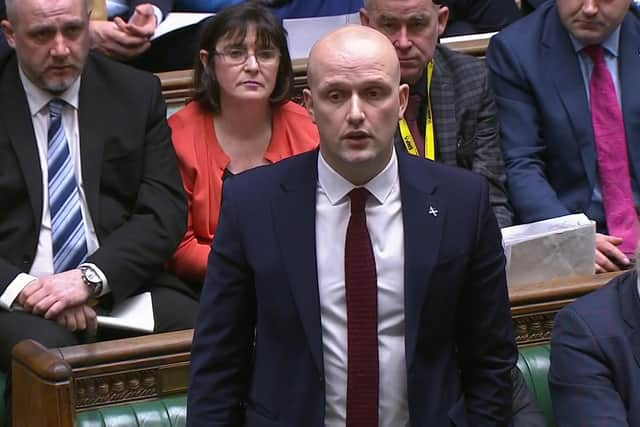Flynn could have emerged as the unlikely statesman if he'd sought common ground - Brian Wilson
It was never likely that the House of Commons debating a ceasefire in Gaza was going to have much influence on anything. The one hope for that lay in reasonable consensus.
A united House of Commons sending a solemn message to Israel just might have had a modest impact, for reasons of history and diplomacy. Whether Hamas would have been interested is even more dubious.
Advertisement
Hide AdAdvertisement
Hide AdIf a clear rejection of violence and a call for peace had been the outcome, Stephen Flynn might have emerged as the unlikely statesman. The fact he blew that opportunity revealed the pathetic truth that this was primarily about partisan, domestic politics rather than the suffering in Gaza.


Labour’s difficulty was Mr Flynn’s opportunity. Hence the impossibilist demand to support a motion that a potential government front bench could not endorse while a significant
number of Labour backbenchers, through belief, naiveté or duress, certainly would.
It happened last October without doing the SNP a lot of good and it would have happened again, without the Speaker’s intervention.
Before that occurred, Mr Flynn could have reflected on whether there might be another approach which would be (a) more productive for his party and (b) even marginally helpful to the cause of peace.
A motion with the same sentiments about the suffering of the Palestinians, a less cursory concession to demands made of Hamas and removal of a single phrase about “collective punishment” could have been negotiated. Critically, the resultant motion – none the weaker in its stated intent - would have remained in the SNP’s own hands.
Mr Flynn could have claimed to have moved Labour’s position, whether true or not, simply by tabling the motion. The Speaker need never have been involved. It would have been quite a coup for a third party in the House of Commons. None of that happened and instead we had a rabble that did nobody in Gaza one iota of good.
Sir Lindsay Hoyle’s mistake was to place the rules of common sense above the primacy of precedent, so that differing positions which should have been reconcilable could be voted on. That fatally underestimated the strength of unstated motivations which were to force Labour MPs into different lobbies and play to a particular domestic gallery.
Advertisement
Hide AdAdvertisement
Hide AdHoyle has apologised for getting it wrong and should be left alone.
The 39 Tory and 29 SNP MPs who have signed a motion calling for his removal scarcely represent the crème de la crème of Parliamentary wisdom. More thoughtful ones should consider the possibility that he was acting out of honest rather than sinister motives.
I have read the Commons debate and the overwhelming impression is how little of substance they found to fight over. The spoken positions from all sides were largely compatible if a search for common ground had been the objective, as has often happened during past conflicts.
Everyone wanted a ceasefire. Everyone agreed, or appeared to, that this depended on both sides laying down their weapons. Everyone wanted the hostages held by Hamas to be freed. Everyone wanted a lasting solution. What was there to justify the scenes we witnessed?
The claim that Hoyle was threatened by Starmer or anyone else with loss of his job after the next election is from the realms of fantasy, as the Speaker himself has made clear.
However, the realistic version which both he and Starmer have also confirmed is, in my view, far more worrying precisely because it reflects reality outside the safe
space of Westminster.
An argument for “the broadest possible debate” was that some MPs were under “frightening” threats of retribution if they failed to vote for a ceasefire. If there was no Labour amendment containing that word, they would be left with a choice between two options, SNP and Tory, neither of which was representative of their position.
While that makes Hoyle’s decision easier to empathise with, it also raises far wider questions which will outlive Wednesday’s hullaballoo. If Parliamentary business has to be framed in a way which factors in threats to the physical safety of MPs who will vote on it, then we have crossed a dangerous line for Parliamentary democracy.
Advertisement
Hide AdAdvertisement
Hide AdI spent 18 years as an MP and the last thing that ever crossed my mind while going about constituency business was personal security.
The idea that anything I said, wrote or voted on might lead to physical intimidation or worse, as opposed to robust debate, never entered my thoughts.
Would it be the same now? In the interim, two MPs have been murdered and two more were victims of serious attacks in their offices. There is talk of buffer zones around MPs’ offices to protect them and their staff from demonstrations. All this has deeply worrying implications which are unlikely to diminish.
I respect Lindsay Hoyle’s concern for the wellbeing of fellow MPs as a factor in his initial decision-making this week. So should Mr Flynn and his colleagues. However, the implications of his reasoning also have to be addressed.
The former Attorney General, Sir Geoffrey Cox, tweeted yesterday that if this was the Speaker’s motivation, it would have been “an abject surrender to intolerance and tyranny; it meekly offers up the House of Commons as able to be influenced by external threats”.
While that may be a bit over the top in the context of a single debate that wasn’t going to decide anything, he does have a point. There’s a lot of extremism out there and it cannot be yielded to as the master or influencer of democratic processes, under any circumstances.
To that end, Parliamentarians also have to consider whether their conduct encourages or rejects these same extreme forces – a test that might reasonably be applied to Wednesday’s proceedings in the House of Commons.